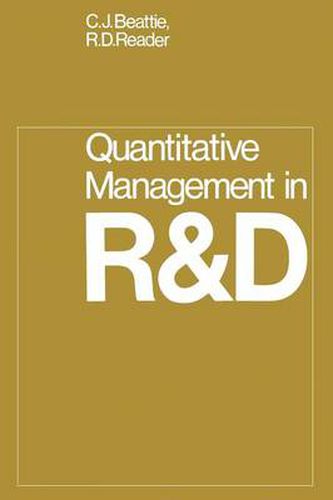Readings Newsletter
Become a Readings Member to make your shopping experience even easier.
Sign in or sign up for free!
You’re not far away from qualifying for FREE standard shipping within Australia
You’ve qualified for FREE standard shipping within Australia
The cart is loading…






This title is printed to order. This book may have been self-published. If so, we cannot guarantee the quality of the content. In the main most books will have gone through the editing process however some may not. We therefore suggest that you be aware of this before ordering this book. If in doubt check either the author or publisher’s details as we are unable to accept any returns unless they are faulty. Please contact us if you have any questions.
Our aim in writing this book has been to present for R&D Managers at all levels the type of quantitative methods that have been developed in recent years for the more efficient management of R&D. Hence, we have sought to write for anyone connected with the control of R&D - from the Directors responsible for the R&D effort of a large organization to the scientist in charge of one or two individual projects. Many of the techniques which we describe have appeared in recent years in the technical journals, often in a largely theoretical form. Few, however, have been made generally available in the management literature, and it has been our intention to fill this need. In doing this, we have concentrated on the tactical aspects of R&D Management - for example, project evaluation and research programme selection. To set these in context, we have also sought briefly to show how the R&D programme stems from the objectives of an organization as regards overall research strategy. We have thus dealt with quantitative management techniques that have seen practical application in R&D laboratories, and have described a number of actual applications to illustrate the method of use in practice. For the sake of simplicity, we have referred to Appendices all detailed mathematics, and other material not essential to an understanding of the main theme. We trust that the reader will discover something of use in these pages.
$9.00 standard shipping within Australia
FREE standard shipping within Australia for orders over $100.00
Express & International shipping calculated at checkout
This title is printed to order. This book may have been self-published. If so, we cannot guarantee the quality of the content. In the main most books will have gone through the editing process however some may not. We therefore suggest that you be aware of this before ordering this book. If in doubt check either the author or publisher’s details as we are unable to accept any returns unless they are faulty. Please contact us if you have any questions.
Our aim in writing this book has been to present for R&D Managers at all levels the type of quantitative methods that have been developed in recent years for the more efficient management of R&D. Hence, we have sought to write for anyone connected with the control of R&D - from the Directors responsible for the R&D effort of a large organization to the scientist in charge of one or two individual projects. Many of the techniques which we describe have appeared in recent years in the technical journals, often in a largely theoretical form. Few, however, have been made generally available in the management literature, and it has been our intention to fill this need. In doing this, we have concentrated on the tactical aspects of R&D Management - for example, project evaluation and research programme selection. To set these in context, we have also sought briefly to show how the R&D programme stems from the objectives of an organization as regards overall research strategy. We have thus dealt with quantitative management techniques that have seen practical application in R&D laboratories, and have described a number of actual applications to illustrate the method of use in practice. For the sake of simplicity, we have referred to Appendices all detailed mathematics, and other material not essential to an understanding of the main theme. We trust that the reader will discover something of use in these pages.